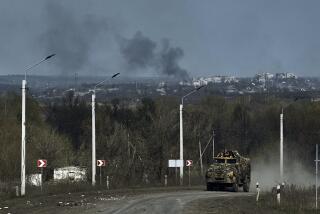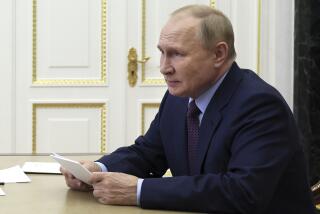Soviets Trying to Extend Latin Role, U.S. Aide Says
- Share via
WASHINGTON — The Reagan Administration will shortly publish new evidence that the Soviet Union is seeking to extend its influence in every Central American country and in Colombia, as well through the “examples” of Cuba and Nicaragua, an Administration official said Sunday.
Nestor D. Sanchez, deputy assistant secretary of defense for inter-American affairs, confirmed a report in the New York Times that a white paper will describe a Soviet plan for Communist expansion in the region. The paper will be used, the newspaper said, to muster congressional support for President Reagan’s $1.1-billion military and economic aid request for Central America.
Sanchez said the forthcoming document is part of a series of white papers designed to make public a large amount of the “mounds of information” that fell into U.S. hands in the 1983 invasion of Grenada.
The introduction to the paper, he said, recounts Soviet Foreign Minister Andrei A. Gromyko’s telling the late Grenadian Prime Minister Maurice Bishop that Central Amer ica is a “boiling caldron” ready for “revolutionary expansionism.”
“There is no doubt that the countries of Central America and the Caribbean are at a critical juncture,” the white paper reportedly says. “But that can be the impetus for the United States to devote the resources necessary to assist the countries of the region.”
Sanchez said he would extend the Soviet target area even further south, to Ecuador. There, he said, “for the first time Ecuadoreans are saying they have to have a new look at their situation so that they don’t develop Colombia’s problems,” which include terrorism and narcotics trade.
The credibility of a 1981 Administration white paper that portrayed Soviet influence in the Salvadoran insurgency was damaged by inaccuracies, but Sanchez said that its underlying case was correct.
“We have had a free ride in Central America, but if we are forced to divert significant manpower and weapons to combat Communist subversion there, it can only be drawn from resources that are now committed to NATO.”
More to Read
Sign up for Essential California
The most important California stories and recommendations in your inbox every morning.
You may occasionally receive promotional content from the Los Angeles Times.













